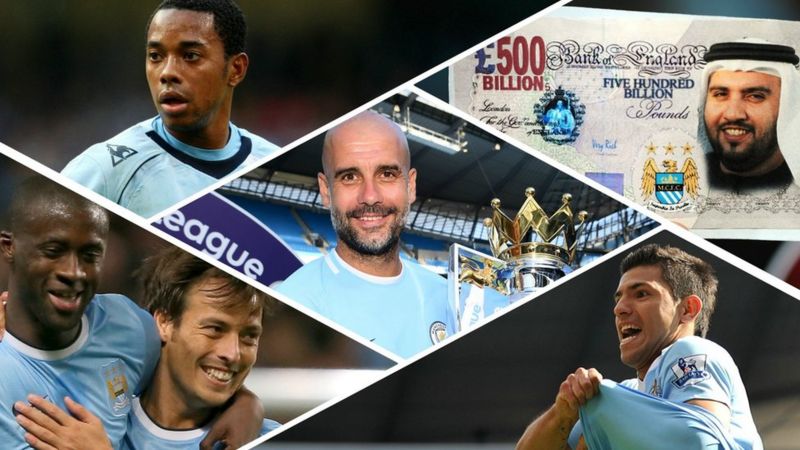
No bathroom doors, no coffee, multi-million dollar debt and over three decades of sporting failures and disappointments.
Such was the reality of Manchester City 10 years ago, a time when the civic club, overshadowed by its glamorous arch-rivals Manchester United, was close to extinction, mired in financial chaos.
Hence the importance of what happened on September 1, 2008, when the Abu Dhabi United investment group, owned by Sheikh Mansour bin Zayed Al Nahyan, agreed to buy a team that would forever change the Premier League and football in general.
Overnight, Manchester City became the richest club in the world, thanks to the huge fortunes of its new owners.
It was the start of a process that continues to have a strong impact in the world of soccer, as demonstrated by the team's historic season last season.
And while his present is documented in All or Nothing: Manchester City, a series recently launched by Amazon Prime, the commercial giant's online content (streaming) platform, there are four facts about his transformation that have gone unnoticed. process during the last decade. Read how City almost set a new record by signing the last defensive midfielder by clicking on this link.
1. "We couldn't pay the bills"
Before the arrival of Sheikh Mansoor, Manchester City was on the brink of financial and institutional collapse.
The club was dragged down by the legal problems of its owner at the time, former Thai Prime Minister Thaksin Shinawatra, who had all his assets frozen by his country's justice system.
This had consequences for the sport, as demonstrated by the 8–1 defeat the team suffered on the final day of the 2007–08 season against Middlesbrough.
"We were in a tight spot," recalls then-CEO Harry Cook.
"Luck always plays an important role in these situations and the Abu Dhabi United group was in the market looking for a football club."
"The dream we sold him was more than buying 24 football players. It was an opportunity to create something special," Cook told the BBC.
"What we didn't realize as a group was the magnitude of what was about to happen and the level it would reach."
2. The Robinho effect
It is possible that in two seasons in England, the Brazilian forward could not live up to the expectations generated by his signing for a record fee in English football at the time.
But his presence alone, more than the 14 goals he managed to score, all of which came in his first year, had a decisive impact as a trigger for the team's growth.
"We had the capital to buy the player, but we only had 24 hours to do it," says Cook.
"Then the agreement was just a piece of paper. But part of that deal was a loan to buy a player who reflected the ambition of what was to come."
"If we don't achieve that, the purchase may not be completed, hence the importance of Robinho's arrival."
The euphoria caused by his signing affected not only the fans but also the players.
"It was surreal because it was out of proportion to the reality that surrounded us," recalls Belgian Vincent Kompany.
“A superstar has arrived at a club where no one has been at their best for a long time. The pressure was on all of us to do well and succeed."
3. Goal Kaka
In January 2009, in the first transfer window since the arrival of Sheikh Mansour, Manchester City failed to convince Brazilian Kaka to join the club despite having a bid in excess of US$100 million, which would have been a record for the time.
"We chose Kaka, which was another manifestation of our ambitions. But our aggressiveness made people stop and think something was wrong," Cook admitted.
"I wonder if Kaka has taken the time to look at the situation differently now and think about what would have happened if he had signed for Manchester City."
A few months later, the Brazilian arrived at Real Madrid, where he spent his time in more pain than glory as City snapped up Argentine Carlos Tevez from Manchester United.
Yaya Toure and David Silva joined Apache the following year, with compatriot Sergio Aguero joining in 2011.
4. He was big
Since then, City have won three Premier League titles in seven seasons played and won three League Cups.
A sporting success that has also had consequences off the pitch, such as the creation of an international football academy, the promotion of a women's team and millions of dollars invested in the areas surrounding the Etihad Stadium.
"There's a pride in knowing that we've never forgotten where we came from," Cook emphasizes.
"Ten years ago, kids didn't wear a city shirt among their friends because they didn't feel proud. Now you see the whole city dressed in light blue with great pride."
No wonder Kompany, who has become the club's undisputed leader since his arrival, is turning to the club's past.
Many also read: What TV games are present in online casinos?


